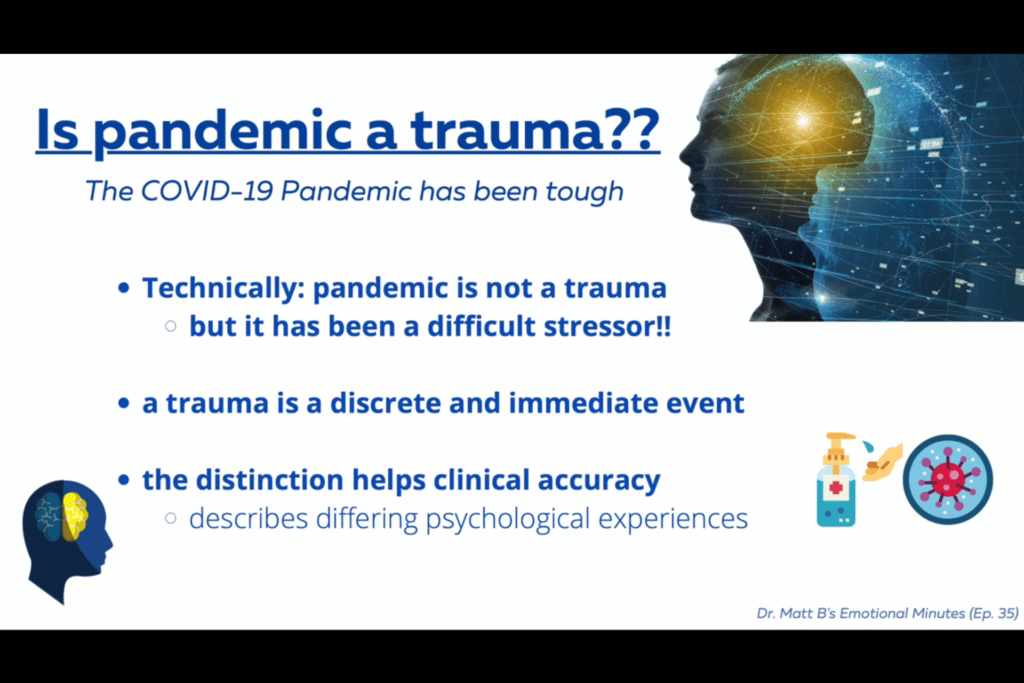The COVID-19 pandemic has been difficult for so many of us. Many people have begun to refer to the pandemic as traumatic. There is no doubt things have been tough, but is the pandemic really a trauma?
If you are interested in learning more about the unique aspects of trauma or posttraumatic stress, there is a good book that describes so much about the experience of trauma. There is also a good book on resilience from stress and trauma.
Hi, it’s Dr. Matt B and these are your Emotional Minutes. Today I’m working in an office at a university. Working in an office feels a little strange right now. This is because it’s late summer 2021 and the COVID-19 pandemic has lasted for the past year and a half.
It has been a very hard year and a half for many people. The pandemic been stressful for a lot of people. Many are feeling anxiety and depression as a result of this challenging experience.
Some have begun to refer to the COVID-19 pandemic as traumatic or as a trauma in itself. People may also on occasion refer to things that are emotionally hard as traumatic. For example, being reprimanded by a supervisor at work. Although things like the pandemic and workplace stress can be emotionally difficult, they would not be considered trauma or traumatic by behavioral scientists.
What is a trauma vs what is not
Behavioral science consider an event to be a trauma or traumatic when it threatens to lead to immediate death or injury. This can also include viewing or experiencing death or injuries of others or loved ones. This type of event is known as a Criterion A stressor because of the way it is diagnosed.
Now, one might wonder whether being sick from a pandemic is physically threatening. It is! And it can be emotionally difficult. But it is not a traumatic event because it is not a discrete instance. An event is classified as traumatic when is discrete and leads to immediate threat of physical harm for oneself or others. Examples of events viewed as immediate threats to physical safety, and therefore considered a trauma, include car accidents, physical or sexual assault, or combat situations.
Who cares: Why make a distinction?
Behavioral science makes this distinction for greater accuracy in distinguishing between types of difficult events. Post-Traumatic Stress Disorder (PTSD) symptoms that can occur from these immediate physically threaten events are often characteristically different than symptoms like depression and anxiety that can occur from more emotionally-based stressors.
It is the same as how a medical doctor may call one type of injury a fracture while calling another a sprain. Both are painful, but they each entail different experiences for the body. Calling one event traumatic and the other stressful implies that they are both difficult, but that each may lead to different emotional outcomes.

Learn more and when to seek help
There is a really good book that describes what people can experience with PTSD. You can also check out our post on PTSD. Another good book how people might experience resilience instead of posttraumatic stress.
I hope you found this video helpful. I talked about how behavioral health clinicians label different types of events. If you believe you are dealing with any of these difficult experiences and they are interfering with your life, I recommend contacting a mental health provider. This can help regardless of whether you have experienced traumatic stress from an immediate physically threatening event, or anxiety or depression from general stressors.
This is Dr. Matt B and these are your Emotional Minutes. We’ll see you next time.



